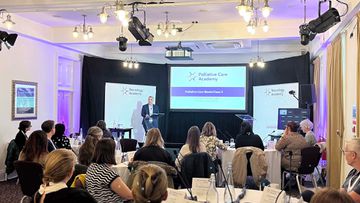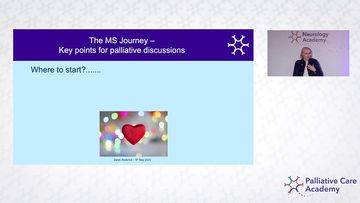Why we need to rethink palliative care for neurology
KnowledgePalliative care has long been associated in our minds with end of life, and often gets popped alongside it as an all-encompassing title of care. But, for many people, palliative care is most definitely not only required at the end of someone’s life.
In the past few years, healthcare has been rethinking palliative care and its role, with research into cancer patients specifically highlighting that the earlier the offer of palliative interventions, the better the outcomes. With one of the many studies stating ‘Early palliative care can improve quality of life, decrease depressive symptoms, and prolong life’, the evidence is strongly in favour of palliative care being available from diagnosis onwards.
Awareness that neurology too needs to embrace this new way of thinking is beginning to trickle down, with research highlighting the need to embrace the principles of palliative medicine and what this might look like. Also now being termed ‘Supportive Care’, these principles underpin the range of support people may need to manage psychological, spiritual and social elements related to their condition.
A number of neurology specialists are leading the way, putting these principles into their practice, unpicking the elements of palliative care and looking laterally at how this support can be given to people when they first need it. Dr Ed Richfield, consultant geriatrician and co-founder of the Palliative Care arm ofthe Neurology Academy’s MasterClasses, puts it very clearly:
‘If I had just been diagnosed I’d have lots of spiritual and existential questions – why me, what now, what about my job?... A lot of people do; diagnosis is a massive event in people’s lives and we’re not meeting those needs.’
Making sure people feel supported in thinking through these big questions, whether they choose to discuss them early after diagnosis or many years down the line, can be the difference in a positive patient, empowered in their choices and seeing quality in their life, and a patient who feels overwhelmed by uncertainty for their future, or defined by the condition they live with. Providing optimal palliative care may be as simple as listening to a patient share their thoughts or concerns – something which may be a paradigm shift for some healthcare practitioners.
‘There is a lot of evidence of people being very badly prepared for the end of life. Taking time to listen to people, to help them plan around what happens without barriers makes a huge difference to people’, Dr Richfield notes.
It was seeing the reactions from the Parkinson’s MasterClass delegates as he delivered his sessions on palliative care that prompted Ed, a Faculty member of the Parkinson’s MasterClass, to work with the Neurology Academy to develop a course specifically on palliative care.
The Neurology Academy prides itself in delivering the most relevant and practical education in neurological healthcare and services, and has worked with Ed to begin a specialist MasterClass spanning multiple neurological conditions. The first course, run in 2017, was provided for specialists across Parkinson’s and dementia and received very positive feedback.
The course material has since been expanded, and in March 2019 the second Palliative Care MasterClass opens its doors to specialists across multiple sclerosis (MS) and motor neurone disease (MND) as well. Discussing the content, Ed notes the key challenges around making it both broad and specific at once. March’s MasterClass sees a wide range of expertise presenting. By bringing in speakers from both palliative care and neurology backgrounds, the hope is to provide a course which is both relevant and accessible to the greatest number of clinicians.
‘We can upskill palliative care specialists in neurology, and neurology specialists in palliative care’, he says.
The Neurology Academy has prided itself in using education to effect change in practice for over 16 years, and is excited to be part of the movement to rethink palliative care for neurological conditions. If you want to be part of this too, there are still spaces available for next year’s MasterClass – visit parkinsonsacademy.co/courses/palliative-care/ for more information.
Related articles
For every person, at any stage
Palliative Care Academy challenges the idea of palliative care as a late-stage service. Whilst recognising the practical nuances and bespoke approaches needed in palliative care for people with dementia, Parkinson's, MS and motor neurone disease respectively, the Academy promotes a holistic and positive approach to palliative care at any stage of any condition.


